- Home
- Alison Kent
Beneath the Patchwork Moon (A Hope Springs Novel Book 2) Page 9
Beneath the Patchwork Moon (A Hope Springs Novel Book 2) Read online
Page 9
“Why?”
“Why?” He looked at her, but didn’t really see her. All he could see was red. “What kind of stupid question is that?”
“You’re not thinking straight.”
“Of course I’m not thinking straight.” He yelled the words, gestured wildly. “You just told me my dead sister had a daughter.”
“Angelo, listen,” she said, closing the drawer, moving closer, the coffee table still between them. “The child is ten years old. She legally belongs with the family who adopted her. She may not even know she’s adopted. Are you really going to charge in like a bull trying to get your way? Because, what? You didn’t come home when Sierra called you, so ruining her daughter’s life is going to make up for that somehow?”
“How is giving her the truth of her heritage going to ruin her life?”
“How is giving her the truth of her heritage going to make the life she has any better? She’s a child, Angelo. A little girl. She may have other siblings, and no doubt friends at school, at church. She might be in dance class, or in Girl Scouts, or taking cello lessons. Telling her where she came from, what happened to Sierra and Oscar… Don’t you see how that truth could turn her world upside down? Even if you could get access to the records, could you really do that to a ten-year-old girl?”
He didn’t have an answer. He wanted to tell her that the child wasn’t the only one in the picture, the only one with stakes in the game. He wanted to tell her that he and his parents and siblings were the girl’s blood relatives, so of course knowing them would make her life better. But that was such a crock he couldn’t believe he was thinking it. He was gripping, reaching for anything to kill the pain. He was trying to make himself feel better over failing his sister before she’d died.
If he’d come home when she’d called him that spring, if he’d stood with her while she talked to their parents, if he’d been the brother he should’ve been, the brother she’d needed, not the selfish ass who was too busy with his own life to care about hers… If he’d done any of that, she wouldn’t have had a reason to be in that car with Oscar Gatlin, traveling the Devil’s Backbone, returning to Hope Springs from giving birth to a child no one had known she’d had.
No one but Luna Meadows. Everything kept coming back to Luna Meadows.
He looked at her, wondering what else she knew. “Why would she have told you to keep her secret? She called me because she was going to tell our parents. Doesn’t sound to me like she was trying to hide it.”
“I don’t know.”
“Did the Gatlins talk them in to giving up the baby?”
“The Gatlins didn’t know she was pregnant. They didn’t tell Oscar’s family either.”
“So I knew, and you knew, and they knew, and the attorney and couple who took the baby knew, and that was it?”
“The couple didn’t take the baby. They took care of Sierra. Once the adoption process was under way, she received incredible prenatal care, probably better than she would’ve been able to provide for herself.”
He scrubbed a hand over his jaw, the guilt that had been there all these years eating away at the wall he’d built to contain it. “You don’t know why she changed her mind? About telling our parents?”
Luna stayed silent, stacking old magazines from under the table in piles on the floor.
“Luna?”
“No. I don’t.” She reached up, rubbed at her temple. “I only knew about the adoption. And I promised Sierra—”
He surged forward, shoved at the magazine stack with one foot, scattering them, tearing them. “I don’t give a crap about a promise you made a decade ago. Things have changed—”
“What exactly has changed? She was pregnant. She died. The only thing different is now you know she gave birth. Your knowing that doesn’t negate the promise I made to your sister. Don’t put me in this position. Not now. Not… yet.”
“What does that mean, not yet?”
“I loved Sierra,” she said, on her hands and knees, gathering the magazines again and fixing the mess he’d made. “I probably loved her as much as Oscar, just not in the same way. Keeping her secrets hasn’t been easy, but I’ve done it because I told her I would. It’s just that… I’m starting to wonder if I did the right thing. And if I did it for the right reason.”
“The right reason? Would that be keeping yourself out of hot water?”
“Actually, no. It wasn’t about me. It wasn’t even about protecting Sierra.”
“Then what?” he asked, waiting as she sat back on her knees.
“I didn’t want the Gatlins to cause trouble for the baby’s family.”
He took a deep breath, letting that settle. “And you thought they could find out who they were?”
“I was eighteen. I was grieving. I was in a lot of physical pain. I wasn’t thinking straight, but even if I had been, I didn’t know anything about sealed adoptions or client confidentiality. What I did know was that the Gatlins always got what they wanted. I couldn’t see this being any different.”
“Did Sierra know the couple?”
Luna shook her head. “They did everything through the attorney Oscar contacted. She wanted the break to be complete.”
“But you still thought the Gatlins could find a way around the legalities.”
“Don’t they always? And there had already been so much heartbreak, for Oscar’s family, for your family. I didn’t want to add to that by coming clean.”
“You should’ve come clean.”
Her hands on her thighs, she narrowed her gaze as she looked at him. “Why me and not you?”
“What?”
“Did you tell your parents she called you? Did you tell them she was pregnant with Oscar’s child?”
“No, because I didn’t talk to them all that summer.” Admitting it now shamed him, but it had been wonderful not having to pick up the phone and hear that something else had gone wrong and he needed to fix it. “I was in Rome, and I thought she’d gone ahead and told them even though I didn’t come home. Next thing I knew, she was gone.”
“I’m sorry. I didn’t know.”
“Now you do. Just like now I know you have been lying all this time. And a lie of omission is still a lie. So what else haven’t you said?”
She got to her feet, dusting off the knees of her jeans, then her seat, never looking at him as she pushed by on her way to the front door and walked out. He didn’t turn, or try to stop her, but let her go, staying where he was, swearing to himself he would get to the bottom of the secrets she was keeping.
Five days, five weeks, five months. He didn’t care how long it took.
He wasn’t leaving Hope Springs till he did.
His appetite gone, Angelo left the house in the other direction and made his way to his father’s woodshop. His parents had brought him to this house from the hospital. Until he’d left for college, this was the only home he’d ever known. Just like the one Sierra’s daughter had been living in her whole life was hers. Even if she’d moved a dozen times in ten years, she had her parents, and possibly siblings, and maybe cousins. Hopefully books she loved, and a favorite pair of shoes or boots, and a beloved plush toy she told her secrets to, and friends.
Luna was right, he mused, closing the door of his father’s woodshop behind him. He couldn’t turn the girl’s life upside down because giving his parents a piece of what they’d lost would make him feel better. And that was all it would be, a face-saving effort because he’d been too wrapped up in himself to come home when Sierra had asked. His last words to her still haunted him, those more than never getting to say good-bye.
“Please, Angelo. I really need you.”
“You got yourself into this mess. You can get yourself out.”
Luna had been right about something else, too. His lie of omission was just as much of a lie as hers. He didn’t know why he’d never told his parents about Sierra’s pregnancy, except it wouldn’t have done anyone any good. It wasn’t, he told himself, because he
didn’t want to explain how he, living nearly eighteen hundred miles away, had known when they, living with Sierra, hadn’t.
Something had happened after her phone call that had kept her from revealing her condition. Something more than his refusal to come home—he was sure of it—had changed her mind, had gotten in the way of her plans. Something he didn’t know, but he was sure Luna did. One more thing he was going to have to get her to spill.
He had a niece. God, he had a niece. A piece of his sister still lived. He wondered what she looked like, if their mother’s Hispanic genes had made themselves known and caused the couple to tell the girl the truth of her heritage. Or perhaps the couple themselves were Hispanic, or dark-haired and dark-eyed. He wanted to see her. He wanted to know her name, to hear her voice, to watch her tumble across a gym mat, or dribble a soccer ball down the field. To see her eyes sparkle when she laughed.
He had a niece. He had a niece. He picked up a ball-peen hammer, rubbed his thumb over the rounded striking head, and then slammed that same surface into the table littered with the detritus of his father’s abandoned work. The contact reverberated up his arm, and he slammed it again, and again, and again, leaving quarter-size dents in the pine, each strike firing off nerves in his elbow, his shoulder, his neck, and his back. He couldn’t swing hard enough, hit hard enough—
The workshop door opened, and he flung the hammer across the table, stirring up dust that danced in the shaft of light slicing into the darkness. Luna, of course. Finding him beating his father’s hammer into his father’s table, the same way she’d found him working out his frustrations on his father’s guitar. Yeah. Nothing subtle here about his issues with his family.
Then again, they’d disowned him, not the other way around.
“What are you doing out here?” she asked, the door squeaking shut behind her, bouncing once, twice.
“Nothing,” he said. Barked, really. Because he didn’t want her thinking she was welcome. Or that he was in need of her comfort. Or wanted her.
“Sounded like you were beating something to death,” she said, coming closer anyway.
“It wasn’t that loud,” he said, ignoring her arched brow.
She moved to the table, picking up a block of wood, a scrap, garbage. “It was loud enough that I heard it on the way to the barn.”
“The barn?”
“I was thinking more about Will’s suggestion,” she said, as if the conversation they’d had in the living room had been thirty years and not thirty minutes ago. As if she were giving both of them an out, calling a truce, allowing him time to breathe. “And about what you said. Wondering if the center could use the barn, too.” She canted her head to one side as she studied him, her hair falling in that direction, like a curtain blocking his view.
He reached for the distraction, nodding toward her. “When’s the last time you cut your hair?”
“I get the ends trimmed every month,” she said, her expression confused.
“Not trimmed. Cut. I’m pretty sure it was as long as it is now back in high school.”
“I’ve had it this long most of my life. Why?”
“You’re pretty fashionable. I’m definitely not, but I don’t think hair that length’s much in style.”
“I don’t wear it long for style’s sake.”
“Then why?”
“Because I want to.”
“Yeah, but… It’s gotta be a lot of work. Why would you want to?”
“I just do,” she said.
He didn’t believe her for a second. “I remember you having it in a braid the day of the funeral. I don’t think I’d ever seen it anything but loose before.”
“I was still immobile then. My mother braided it to keep it from getting tangled in bed.”
“You never braided it when you slept with me.”
Her cheeks colored, and she dropped her gaze. “Being in traction isn’t quite the same as sleeping.”
She knew as well as he did that sleeping wasn’t what they’d done in bed. “You were in a wheelchair that day. I was surprised your doctor released you to come.”
“I went right back. It was an afternoon pass.” She stopped, studied him. “I can’t believe you’re admitting that you saw me there. You certainly didn’t acknowledge me. None of you did. Unless ignoring me, walking off the path where I was sitting so you didn’t have to speak to me, counts. I mean, it wasn’t like we were involved or anything. Oh, wait. As far as anyone else knew, we weren’t.”
But she knew. And he knew. “It was that kind of day.” Yeah. He shouldn’t have brushed by her the way he did.
“I didn’t get treated much better the day your family moved.”
“Things with my parents moving…” He shook his head. He hated thinking about it. He sure didn’t want to talk about it. “That was rough. They walked from room to room like they didn’t even know where they were.”
“They knew who I was. That was very obvious.”
He’d been there. He remembered every word they’d spoken. “Like I said. Things were rough.”
She reached for the hammer he’d abandoned, popped it against the table, though with less force than he had. “I came very close both of those times to telling your parents about the baby.”
Interesting that she’d use the information as a weapon. Because that’s what it sounded like she was saying. “Even though you had an obligation to Sierra.”
“I’m human, Angelo. Your family felt like an extension of mine. To be treated like I didn’t exist, like I hadn’t lost Sierra, too, well, it hurt. A lot. And, yes. I thought about striking back. But it was a childish response, and I knew I’d regret it if I did.”
He let that settle, wishing—and for not the first time—that he could take back that day. His parents, who for years had assumed he’d handle what they couldn’t, or what they wouldn’t, had seen him arrive with Luna and ordered him gone. He’d stayed and helped anyway, until there was nothing more to do, then watched his mother and father, his brothers and sisters pile into their car and leave.
Only ten-year-old Felix, on his knees in the back seat, had waved good-bye, his cupped fingers moving in the smallest of motions. That picture had stuck with Angelo more than anything else from that day. That and Luna’s dry eyes as she’d dropped him at the airport in Austin for his trip back to New York.
After a long silent moment, she asked, “Do you think they still hate me? For surviving?”
“You think that’s why they hate you?”
“I can’t think of anything else. They didn’t know about the pregnancy or the adoption.”
“They knew you and Sierra were supposed to have been at art camp. That Oscar was supposed to have been at a music workshop. They knew the three of you had no reason to be driving the Devil’s Backbone,” he said, and watched her face blanch. “Did I hit a nerve?”
“Just the one attached to the memory.”
He didn’t believe her, but he watched her gaze fall, watched her hand flex around the hammer’s handle.
“Do you still hate me?”
He was pretty sure what he hated was being unable to change the fact that right now, more than anything in the world, he wanted to kiss her again.
“I don’t know what I feel anymore, Luna. For you, for this place. I don’t know what I feel.”
She returned the hammer to the table and shoved her empty hands in her pockets. “Does that mean you don’t want to stay and be a part of the center?”
“I haven’t decided. But whether I do or don’t, I’m going to get my answers.”
CHAPTER ELEVEN
Luna was just stepping onto the porch, carrying a box of clothing from the closet shared by the two youngest Caffey boys, when Oliver Gatlin’s BMW rolled to a stop on Three Wishes Road, blocking the driveway. She was still dealing with the revelation of Angelo knowing about Sierra’s pregnancy, and Sierra not sharing her plans to tell her parents about the baby. Her emotions felt as if they were sitting on the surface of
her skin, burning. She had no desire to see Oscar’s brother. But it seemed she was doomed, so she set the box on the edge of the porch with the others designated for donation.
He exited the car, all fluid motion, nothing wasted, effortless, and headed toward her, his eyes hidden behind expensive shades, his shoulders draped in cream-colored cashmere, the sweater incongruous with Texas’s autumn temps. His jeans no doubt bore an expensive designer label. The word fit him: expensive. His clothes and car. The cut of his hair. His attitude. His expectations.
She walked down the porch steps and met him in the yard. “You need to move your car. I’ve got a truck coming to pick up these things.”
“I won’t be long.” He pulled off his glasses, hooked the earpiece over the sweater’s neckband. “Just thought I’d swing by.”
Right. “Can’t wait to see what I do with the place?”
“Can’t wait to see this place gone.”
Little did he know he might not be getting his wish after all. “It wasn’t enough that your family drove this one from town?”
He gave a shake of his head and a huff of a laugh. “Yeah, it took me a while to figure out why my mother was so obsessed with Mike Caffey’s furniture business.”
So she’d been right thinking Merrilee Gatlin had something to do with the downturn in Mike’s orders. “What? She needed to exact some sort of twisted revenge on Sierra’s family because her son couldn’t control his car? The Caffeys didn’t have anything to do with Oscar’s driving.”
“No, but it was their daughter who had him out driving somewhere he had no business being.” He shoved his hands in his pockets and looked away, a vein in his temple throbbing. “I found an attorney in Kerrville who specializes in private adoptions. Guess what her name is?” he asked, his gaze coming back to catch hers.
“I don’t care what her name is.” She turned for the house, hoping she could reach the porch before her legs gave out. If he learned the truth about the adoption, how long before he learned the rest? Breathe, Luna. Breathe.
“Wait.”
It was a plea. Not a demand. One at odds with everything she knew about Oliver Gatlin. Against her better judgment, she stopped. “What?”

 Beneath the Patchwork Moon (A Hope Springs Novel Book 2)
Beneath the Patchwork Moon (A Hope Springs Novel Book 2) The Second Chance Café (A Hope Springs Novel Book 1)
The Second Chance Café (A Hope Springs Novel Book 1) The Sweetness of Honey (A Hope Springs Novel Book 3)
The Sweetness of Honey (A Hope Springs Novel Book 3) The You I've Come To Know (A Mother's Love Book 1)
The You I've Come To Know (A Mother's Love Book 1) The You I'll Love Forever
The You I'll Love Forever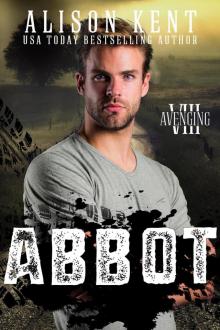 Abbot
Abbot The You I Want For Life (A Mother's Love Book 2)
The You I Want For Life (A Mother's Love Book 2) The You I've Come to Know
The You I've Come to Know The Comfort of Favorite Things (A Hope Springs Novel Book 5)
The Comfort of Favorite Things (A Hope Springs Novel Book 5) The You I Want for Life
The You I Want for Life Hope for the Holidays: a Christmas novella (A Hope Springs Novel Book 6)
Hope for the Holidays: a Christmas novella (A Hope Springs Novel Book 6) Bliss and the Art of Forever (A Hope Springs Novel Book 4)
Bliss and the Art of Forever (A Hope Springs Novel Book 4) Play Me (Barnes Brothers Book 2)
Play Me (Barnes Brothers Book 2)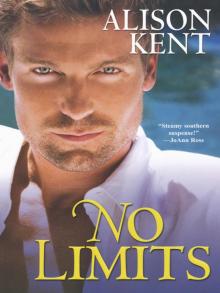 No Limits
No Limits Love in Bloom
Love in Bloom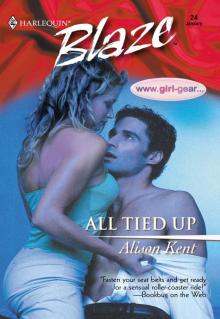 All Tied Up
All Tied Up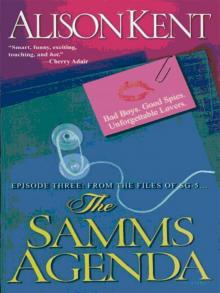 The Samms Agenda
The Samms Agenda The Second Chance Café
The Second Chance Café One-Click Buy: March 2009 Harlequin Blaze
One-Click Buy: March 2009 Harlequin Blaze BOUND TO HAPPEN
BOUND TO HAPPEN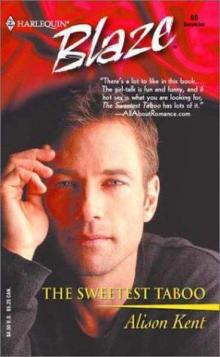 The Sweetest Taboo
The Sweetest Taboo The Second Chance Café (A Hope Springs Novel)
The Second Chance Café (A Hope Springs Novel) Undeniable
Undeniable Striptease
Striptease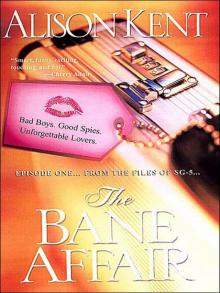 The Bane Affair
The Bane Affair At His Mercy
At His Mercy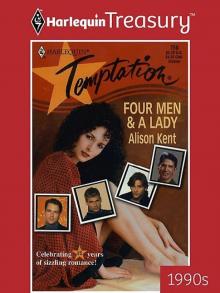 Four Men & A Lady
Four Men & A Lady The Comfort of Favorite Things (A Hope Springs Novel)
The Comfort of Favorite Things (A Hope Springs Novel) Unforgettable (The Dalton Gang #3)
Unforgettable (The Dalton Gang #3) Goes down easy: Roped into romance
Goes down easy: Roped into romance Holiday Kisses: A Rare GiftMistletoe and MargaritasIt's Not Christmas Without YouThis Time Next Year
Holiday Kisses: A Rare GiftMistletoe and MargaritasIt's Not Christmas Without YouThis Time Next Year No strings attached
No strings attached Playing Love's Odds (A Classic Sexy Romantic Suspense)
Playing Love's Odds (A Classic Sexy Romantic Suspense) Unbreakable
Unbreakable Red Hot Holiday Bundle
Red Hot Holiday Bundle Kiss & Makeup
Kiss & Makeup The Shaughnessey Accord
The Shaughnessey Accord Larger Than Life
Larger Than Life Call Me: sold live on CBS 48 Hours (Barnes Brothers Book 1)
Call Me: sold live on CBS 48 Hours (Barnes Brothers Book 1) With Extreme Pleasure
With Extreme Pleasure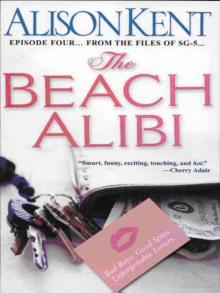 The Beach Alibi
The Beach Alibi Indiscreet
Indiscreet The Sweetness of Honey (A Hope Springs Novel)
The Sweetness of Honey (A Hope Springs Novel) Maximum Exposure
Maximum Exposure